Articles about reggae music, reviews, interviews, reports and more...
Interview: Wailing Souls
- Home
- Articles
- Interviews
- Interview: Wailing Souls

Interview: Wailing Souls
"Everything has come back around to the roots. Even in the United States or Japan, it's the roots that people want to hear"
Sampler
The Wailing Souls are in many ways the quintessential reggae harmony group. They formed in the ghetto of Trench Town, were coached by the late great Joe Higgs, and were imbued with a similar but distinct sound from the Wailers. But while Bob Marley went on to become a mainstream music icon, the Wailing Souls remained popular in the dancehalls of Jamaica from their early works for Coxsone Dodd at Studio 1, through the mid-to-late-seventies at Channel One, to the eighties recording for Henry Junjo Lawes and beyond. Back in May, Angus Taylor caught up with core members Winston “Pipe” Matthews and Lloyd “Bread” McDonald at Harlesden’s famous Hawkeye Record store while they were visiting for their sell-out UK tour.
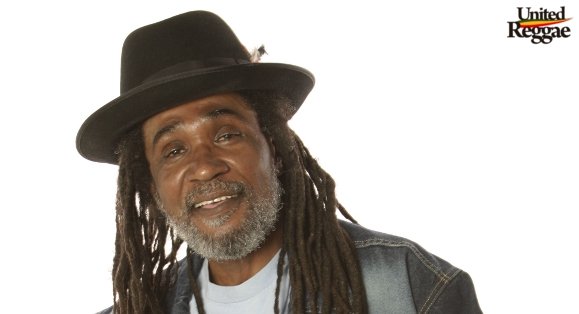
Bread - Photo by Janice Salzman
How did you and Pipe first meet?
BREAD: We grew up together in Trench Town “from kids in short pants” as we used to say. Before we were even 12 years old we met each other. Pipe went to Denham Town school and I went to Greenwich Town school so we grew up together.
What were your first impressions of each other?
BREAD: As a boy you gravitate towards people who share similar interests and we always shared a love of music and a love of sports. So those things drew us together as it did a lot of our friends. You see, among the people we grew up with in Trench Town at the time, the elder boys were like Bob Marley, Peter Tosh, Bunny Wailer, Joe Higgs and Delroy Wilson so we always had the music there with us. But we also had the sports because we had Boys' Town Club next door which produced some of the greatest cricketers in Jamaica - most notably a guy called Collie Smith who played for the West Indies - and the best soccer team. We've always been sports and music oriented.
Can I ask who was best at sports out of you two?
BREAD: Well it was no competition! But I used to pay more representative cricket than Pipe because I played for Jamaica youth teams and stuff like that!
Who was your biggest musical inspiration when growing up?
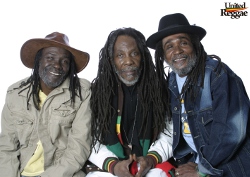 BREAD: I had a lot of influences. There were influences from abroad like the Temptations and the Impressions. I always loved those groups. Even the Beatles who were one of our favourite groups growing up in Jamaica. And from the Jamaican side it was always people like the Wailers, Delroy Wilson, Joe Higgs, as well as Ken Boothe and Slim Smith.
BREAD: I had a lot of influences. There were influences from abroad like the Temptations and the Impressions. I always loved those groups. Even the Beatles who were one of our favourite groups growing up in Jamaica. And from the Jamaican side it was always people like the Wailers, Delroy Wilson, Joe Higgs, as well as Ken Boothe and Slim Smith.
Now Joe Higgs played an especially big part in your development didn't he?
BREAD: He was a foundation singer in our community at the time and he was also responsible for bringing the Wailers together and teaching them the basics like harmonising and stuff like that. Then he did the same thing with us. We met Joe and by that time the Wailers had already got themselves established. Joe was like that. It was not only us. There were other Jamaican singers who he helped along the way. He took us under his wing and taught us how to harmonise, how to make good songs, and taught us the business part of it, saying we must join up with the PRS. Joe Higgs was a man who taught us a lot of stuff in many ways, musically and businesswise.
 Joe Higgs took us under his wing and taught us how to harmonise, how to make good songs, and taught us the business part of it, saying we must join up with the PRS
Joe Higgs took us under his wing and taught us how to harmonise, how to make good songs, and taught us the business part of it, saying we must join up with the PRS
Over the years there has been some disagreement between Jamaican musicians and writers about where reggae was invented. Would you say it was invented in Trench Town?
BREAD: I would have to say yes. Trench Town is like a musical college. If you know the history of Jamaican music and you go back to the beginning you'll find it was the guys from Trench Town. You see, everybody lived in Trench Town one way or another. Even the guys from the Skatalites, a couple of them came from Trench Town. Then you had people like Higgs and Wilson who were from Trench Town. Before them you had Bunny and Skully who were from Trench Town. Lascelles Perkins was from Trench Town. Alton Ellis, Delroy Wilson and the list goes on and on. And of course the Wailers were from Trench Town so Jamaican music was born right there.
Now, being from Trench Town, you worked with Joe Higgs, you worked at Tuff Gong for a while, and Pipe's voice has been compared to Bob Marley. Do you think that association with the Wailers has helped your career?
BREAD: (laughs) I know it hasn't hurt us! Perhaps it has in some way but I know that “every tub has to sit on its own bottom” as we say in Jamaica so we had to do our own thing. The similarity comes out of the same Joe Higgs experience. The harmonies sound the same so when you listen to our songs they sound like the Wailers. As you say, Pipe sounds a bit like Bob Marley and the whole group sounded like the Wailers due to the harmony structures and all that. We grew up together, we rehearsed together and we sang together. Bob was like a big brother for us.
 If you know the history of Jamaican music and you go back to the beginning you'll find it was the guys from Trench Town
If you know the history of Jamaican music and you go back to the beginning you'll find it was the guys from Trench Town
Your eponymous first LP for Studio 1 is one of the most perfect reggae albums ever made, yet it doesn't get reissued so often. Why is such an excellent album so hard to get hold of?
BREAD: The producer of the album [Coxsone Dodd] had the master tapes and it's always up to him. He didn't have international distribution on that first album - he did everything himself. And now that he's dead it's even harder to get a hold of. But I think it's mainly because of the distribution. Back in the days when we had that record released there wasn't a lot of international distribution for reggae. It was just mainly England. So I think that's a part of it because most of our other records we have done more recently in the States are easily accessible.
You voiced for Studio 1, Pipe recorded for Prince Buster, you both voiced at Channel One, you released on Greensleeves, and worked with Junjo, Jammy and so on. Your career always seems to have involved the biggest and most important names on the island.Is there anyone that you didn't get to work with that you would have liked to?
BREAD: Yes, there were quite a number of producers we would have liked to work with but we still have time for that! We like to say, "Nothing happens before the time"! In terms of a singer that would have to be the great Bob Marley. Sadly he is not around anymore but that would have been great. We and Bob.
 Bob Marley was like a big brother for us
Bob Marley was like a big brother for us
How often do you go back to Jamaica these days? What are you views on the State Of Emergency being declared. Can you comment on that?
BREAD: Oh, quite often. Sometimes three times a year. I was there last January. The last time we played there was January 2009 at Rebel Salute. I can't say much because I'm not down there to see what's going on right now. But we knew it was going to happen sooner or later because it was brewing for a while. As you know the US government wanted Dudus extradited but the Jamaican government wasn't doing it so we knew it was going to come to this at some time.
Also, Sizzla has moved to Africa. What do you think of that?
BREAD: That's good. I think that's good. I am longing to go to Africa myself. We spoke to a lot of promoters recently and hopefully maybe we can go by the end of the year. Because we have spoken to promoters in the past and things were looking good only to find out it wasn't going to happen again. But again, as we always say, "Nothing happens before the time". It's the one continent we haven't played on yet.
You had success is what are called the "roots" and "dancehall" eras of reggae. Do you see any connection between yourself and the current dancehall artists?
BREAD: Not really because they do a different dancehall from us. But from day one the music was dancehall music. 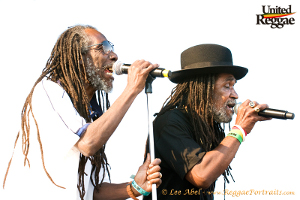 Roots music was the music of the day but it was in the dancehall so it was dancehall music. The Wailers were dancehall artists back in the day. So it's just a different variation of it now with this current crop of artists. I don't think they're doing it any good really. Maybe I'm old but we like music with lyrics and good melodies and it seemed like everybody loved that. Because, up to this day, Bob Marley is the biggest selling reggae artist - and that's the type of music we sing. That's the kind of music everybody loves - good message, good melodies, good music.
Roots music was the music of the day but it was in the dancehall so it was dancehall music. The Wailers were dancehall artists back in the day. So it's just a different variation of it now with this current crop of artists. I don't think they're doing it any good really. Maybe I'm old but we like music with lyrics and good melodies and it seemed like everybody loved that. Because, up to this day, Bob Marley is the biggest selling reggae artist - and that's the type of music we sing. That's the kind of music everybody loves - good message, good melodies, good music.
 Maybe I'm old but we like music with lyrics and good melodies. That's the kind of music everybody loves - good message, good melodies, good music
Maybe I'm old but we like music with lyrics and good melodies. That's the kind of music everybody loves - good message, good melodies, good music
What do you think about the current restrictions of movement on dancehall artists who've had their VISAs revoked?
BREAD: I think freedom of expression is supposed to work for everybody. So I don't really believe in that. But then again, you have to look at the other people's point of view. Music is a thing that is supposed to bring peace and love and unity. It's not a thing that's supposed to be bringing a separation and if you listen to some of these lyrics they are trying to separate people. I think music is for bringing people together.
Which modern artists continue the legacy of Wailing Souls?
BREAD: I'd have to think long and hard about that! For real. Because most of these current groups are not really roots orientated and they're not really Rastas so they don't have similar meditations. But don't get me wrong, there are some nice little artists in Jamaica right now that I really love to listen to. Give them a few years and they're going to be good. I like Busy Signal, I like Chris Martin. I like Freddie [McGregor's] kids Stephen and Chino a lot too. There's a little guy you'll soon start hearing about named Tunder. His record hasn't been released yet but while I was down there in December he played me some tracks. There are quite a number of good artists down there right now.
You've done a lot of touring since you started. Which is more important - playing live or recording? And do you think music can survive if recordings are given away for free?
BREAD: They both go together because after you record your album you need to take it to the people live. So I think they're both important and both go together. Now you make more money touring but if it was given away for free people would just have to depend on touring. I don't think it's going to happen though. It costs money to make records so people are at least going to need to recoup what they spend. We'd have to stop having records so that's not really a logical thing.
Various members of Wailing Souls have come and gone. What has been the key to you and Pipe maintaining your partnership through the years? And has your message always stayed the same throughout?
BREAD: We grew up together from a young age and we formed the group. It was our idea. We are the engines and that's it right there. Our message? Yeah man it always does even when we venture into other genres. Like if you listen to our All Over The World album, that's mostly American dance and some R&B, and as a matter of fact that was our first Grammy nomination. But even when we did that the message still remained the same. Our message is peace, love and unity. We're not going to change that. Equal rights and justice. We'll always sing about those things.
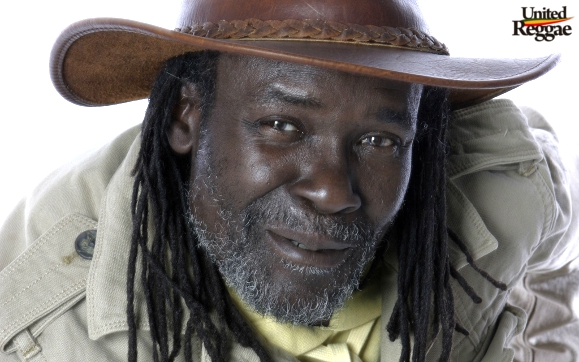
Pipe - Photo by Janice Salzman
Pipe, what's been the highlight of your tour so far?
PIPE: It's that people haven't seen us for so many years. Every night, even though we have a duration of 90 minutes we have to do two and a half hours because they want more and more. Everywhere we play they want us to come back.
When you last played in the UK you performed along with The Meditations and Fred Locks at the Astoria when everyone turned out to pay tribute to Junior Delgado's passing. Do you prefer to play your own shows or with other artists on the bill?
PIPE: We prefer headlining. We can do four, five, or even seven hour shows because we have the songs. But sometimes the promoters choose to bill you like that. Usually in America we do those sorts of things as festivals - where you have so many artists - but we also do our solo tour every year in the United States because we bring the crowds of our followers. Doing shows over here like that one for Junior Delgado at the Astoria is just a one away thing. We don't usually work like that. We usually have our own show, maybe with an opening act. We'll play for 90 minutes to 2 hours. It depends on what your fans call for.
Obviously you have a lot of followers but do you prefer playing in small intimate venues sometimes?
PIPE: I like large venues because the more people I see the more I work. What happens is most of the time the small promoters cannot get those big venues so sometimes you have to do that to reach your people. But I prefer the large venues. 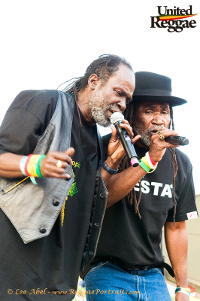 We've played to crowds of 20,000-90,000 people in the United States but most of the time you have to just deal with what you had to deal with. If it's a large crowd you deal with it. If it's a small crowd you deal with it. Because we want to get our message out to the people and wherever the people are you have to reach them.
We've played to crowds of 20,000-90,000 people in the United States but most of the time you have to just deal with what you had to deal with. If it's a large crowd you deal with it. If it's a small crowd you deal with it. Because we want to get our message out to the people and wherever the people are you have to reach them.
Would you say your audience is mostly outside Jamaica these days?
PIPE: Yes! From when we first started we were known as an international seller. Our songs were always bought by people internationally. In our country people still bought but now the business isn't as it was before when it comes to the music. It's completely changed. But we were strong sellers internationally so all our music was released internationally.
The UK reggae scene hasn't had the best of times in recent years but do you think things have been improving from what you saw on your visit?
PIPE: Well the music went down for a little while because there was a change and confusion between the music. I have to let you know this - there was a big confusion with the music. You see the deejays came with the dancehall thing but the dancehall thing was already started from day one because the music was always played in the dancehall. So it's confusing because people have been listening to the good singing music and then they hear someone come and say "dancehall music" as if it's another type of music. The whole thing is reggae music. So that kind of got the people a little way and then some of these artists do songs that the people really don't like so it kind of brought music down a bit. But everything has come back around to the roots. Even in the United States or Japan, it's the roots that people want to hear. There's a new revolution of kids now who are a younger generation and those kids didn't hear the good music so we really have to take it to them now.
 There's a new revolution of kids now who didn't hear the good music so we really have to take it to them now
There's a new revolution of kids now who didn't hear the good music so we really have to take it to them now
Read more about this topic
Comments actually desactivated due to too much spams
Browse by categories
Recommended Articles
Latest articles
Recently addedView all
© 2007-2026 United Reggae. All Rights Reserved. Reproduction in whole or in part is prohibited. Read about copyright
Terms of use | About us | Contact us | Authors | Newsletter | A-Z














